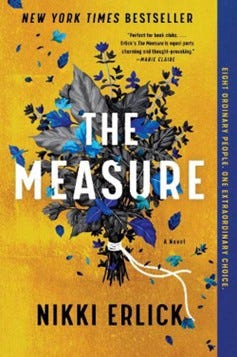Would You Open the Box? Reading The Measure in an Age of Dystopia
I’ll be honest—I don’t always reach for dystopian fiction these days. The real world feels precarious enough. Climate change, political chaos, existential dread... it can all get a bit much, can’t it?
But The Measure by Nikki Erlick isn’t your typical bleak-and-barren dystopia. It’s gentle, warm, and surprisingly hopeful—even as it tackles one of the biggest questions you could ask:
If you could know the date of your death, would you want to?
That’s the premise. One morning, every person on Earth receives a box. Inside is a string. Some strings are long. Some are short. No one knows why—or how—but soon, the connection becomes clear. The length of your string matches the length of your life.
And just like that, the world splits into two kinds of people: the long-stringers and the short-stringers.
What Would You Do With That Knowledge?
Would you open your box? I found myself asking that question over and over while reading. And then the follow-up questions came tumbling after:
Would I want to know how long I had left?
Would it help me live better, or would it paralyse me?
Would I treat people differently based on their string?
What if the people I loved were short-stringers—what would that do to me?
That’s what The Measure does so beautifully. It doesn’t just run with its premise—it sits with it. It leans into the emotional, moral, and philosophical chaos of a world where death becomes visible, measurable. And somehow, it never loses sight of the humans at the centre of it.
This was one of those books I had to talk about with people as I was reading it. The kind of story where you’re texting your friend after every chapter, saying “Wait, what would YOU do?” It’s absolutely ripe for discussion—which makes it a perfect pick for a book club. There is so much to unpack here, and everyone will bring their own questions, fears, and beliefs to the table. It’s not just a book you read. It’s a book you talk about.
More Introspective Than Apocalyptic
If you’re worried this is another grim “society crumbles” story, don’t be. Erlick takes a different path. This is more The Midnight Library than The Road. It’s about choices. About how we love, who we trust, what we believe in—and how we spend the time we’re given.
There’s political drama, yes. Prejudice creeps in. It’s unnervingly close to how humans really behave. But there’s also friendship. Love. Found family. Forgiveness. Characters who still choose kindness, even when they know their time is running out.
The Rise (and Appeal) of Thoughtful Dystopia
We’re seeing a rise in these kinds of speculative books—ones that sit somewhere between dystopia and philosophy. Books like The End of Men by Christina Sweeney-Baird, The Power by Naomi Alderman, or Klara and the Sun by Kazuo Ishiguro. They all use a single, strange idea to ask very human questions. The world almost looks like ours—but not quite. And that gap is where all the meaning lives.
The Measure taps into something universal. Not fear, exactly. But curiosity. Mortality is one of the only certainties we have—and yet, we live like it isn’t.
Erlick’s gift is that she doesn’t answer the big question for you. She just makes you feel it.
So, Would You Open the Box?
I still don’t know. Maybe I’d open it and regret it forever. Maybe I’d never open it, but spend the rest of my life haunted by the possibility. Maybe I’d open it, see a short string, and finally start doing the things I keep putting off.
And maybe that’s the point.
If you’ve been avoiding dystopian fiction because the world feels like enough already—I hear you. The Measure is worth making an exception for. It’s moving, compassionate, and quietly profound.
It’s the kind of book that doesn’t just ask “what if”—it asks what matters?
And you don’t need a box to start thinking about that…
And honestly? There has never been a more perfect moment to say .. “because life is too short to read bad books”…


